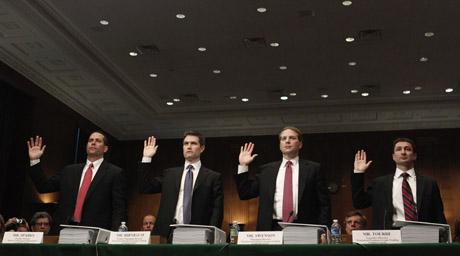We are, as usual, at a financial crossroads and the signs to guide us to the proper route are, also as usual, smeared with graffiti and conflicting directions. But in this instance the crossroads are significantly more important than at other times; it's a bit like equality amongst Orwellian animals. Decisions made in times of Great Recessions carry much more impact for the future than any other time.
Roadsign To Future Success
But, at least, we have a pretty good picture of the possible futures we may face:
- (a) High(er) inflation, caused by the massive amounts of "new" money created by western central banks and governments in the course of The Great Bailout or,
- (b) Deflation, caused by the default of these western nations crushed by their massive sovereign debt obligations versus their earned income or,
- (c) None of the above, see further below.
In the current context most analysts and academics are already choosing (a) high(er) inflation, though they routinely mask their arguments in terms of "growth", "recovery", "higher real interest rates", etc. They expect this to be the least painful eventuality, probably because of their familiarity with high inflation during the 1970's and '80s. Another reason, particularly for Americans, is their institutional fear of the Great Depression with its wrenching bank runs, dust bowls and fulminating political unrest. (They didn't call them grapes of wrath for nothing, and it should be remembered that in the 1930's the monied classes considered FDR a communist.)
As partial - but powerful - proof that the cognosenti are preparing for Future (a), PIMCO (the world's largest fixed-income money management firm based in California, assets under management $1 trillion) is planning to offer actively-managed equity funds for its clients, since bonds severely underperform equities in times of rising inflation.
By contrast, almost no one is seriously predicting a
real bout of Great Deflation - no one, that is, but members of the inevitably regular doomsayer brigade for whom the clock is permanently stuck at 5 minutes to
catastrophe du jour. But
some of them may have something valuable, indeed, to contribute to our views on possible monetary and fiscal futures; I should't even call them doomsayers. Prophets of inflection points, perhaps?
I am referring to
peak oil theorists and analysts. First, please note the absence of capitals in "peak oil"; it is meant to separate sober fact from the panting and hyperventilation common just a couple of years ago, when crude oil had reached $150/bbl. Add
climate change to the mix, stir well and let settle. Do you see a possible monetary future emerging - or, at least, a
desirable future?
- (c) A plateau-eing in outstanding amounts of money/debt, zero to slightly negative overall credit expansion, very low interest rates and the gradual removal of finance from center stage in the economy.
Under such a scenario, central banks and policy makers are going to dust off a long-neglected monetary policy tool, i.e.
targeting money supply.
I claim that the EU/IMF $61 billion standby
bailout arrangement for Greece can and should be interpreted in terms of money supply conservation, i.e. it is meant to prevent the rapid evaporation of fiat money/debt into thin air via default. At the same time, because of global sober credit evaluation and very low risk appetite it is impossible to create trillions in
incremental high-powered money/debt. Leverage has become a four-letter word and I believe it will remain so for decades.
Now, is the road-sign any clearer? Umm..






